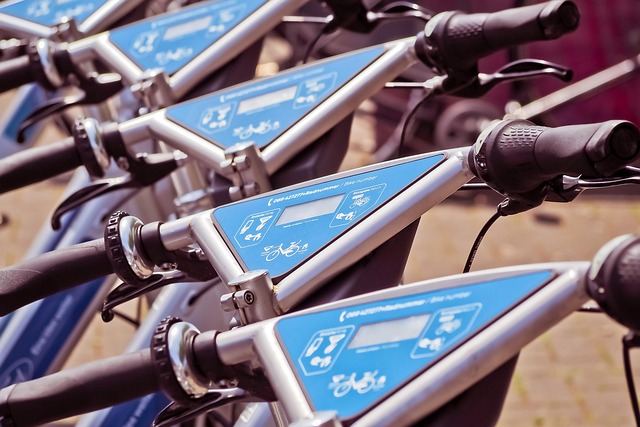Category: Rent Porta Potty
Rent Porta Potty: Revolutionizing Sanitation Solutions
Introduction
In the realm of modern sanitation, a discreet yet indispensable solution has emerged, transforming how we manage portable restrooms in various settings—the art of renting porta potties. This article aims to embark on an comprehensive journey through the world of rent-a-potties, exploring its definition, global impact, economic implications, technological innovations, regulatory framework, and future prospects. By delving into these aspects, we will uncover the multifaceted nature of this seemingly simple yet vital service.
Understanding Rent Porta Potty: Unveiling the Basics
Rent Porta Potty, at its core, is a service that involves providing portable sanitation units for temporary or extended use at events, construction sites, remote locations, and areas where traditional plumbing facilities are unavailable or inadequate. These portable restrooms, often called porta potties, are designed to offer a clean and hygienic experience despite their compact size.
Core Components:
- Sanitation System: The primary focus is on the inner mechanism that treats waste. Modern porta potties employ various technologies, including vacuum systems, chemical treatments, or septic tanks, ensuring safe disposal and odour control.
- Exterior Design: These restrooms are constructed with materials like plastic, fibreglass, or stainless steel to withstand outdoor conditions. They feature a basic structure with a seat, sink (in some models), and a collection system for waste.
- Ventilation and Insulation: To maintain comfort, especially in colder climates, proper ventilation and insulation are crucial. This ensures the interior remains at a habitable temperature during usage.
- Accessories: Additional features can include hand sanitizers, paper towels, female stalls with privacy partitions, and wheelchair accessibility.
Historical Context:
The concept of portable restrooms dates back to ancient times when travellers relied on natural cavities for sanitation. However, the modern porta potty as we know it today emerged in the 1960s, catering to the growing demand for temporary sanitation at construction sites and outdoor events. Over time, technological advancements have improved their efficiency, comfort, and environmental impact.
Global Impact and Trends: A World of Sanitation Solutions
Rent Porta Potty has left an indelible mark on various regions, addressing unique challenges in different parts of the globe.
Regional Variations:
- North America: Known for its robust infrastructure, North America has a well-established rent-a-potty industry, catering to events, construction sites, and remote work sites. Companies offer diverse options, from basic models to luxurious, eco-friendly units.
- Europe: European countries have stringent environmental regulations, driving the adoption of eco-friendly porta potties. The region sees a surge in demand for sustainable sanitation solutions, with companies promoting waterless and compostable options.
- Asia-Pacific: Rapid urbanization and economic growth in this region present unique challenges. Portable restrooms are increasingly utilized at construction sites, festivals, and outdoor gatherings, with suppliers offering affordable, durable options.
- Latin America and Africa: In these regions, access to sanitation remains a priority. Porta potties play a crucial role in providing basic sanitation infrastructure for rural communities, events, and temporary settlements.
Key Trends Shaping the Industry:
- Sustainability: There is a growing global push for eco-friendly porta potties, with companies introducing waterless, compostable, and energy-efficient models.
- Smart Sanitation: Technological advancements have led to the development of smart porta potties equipped with sensors for waste level monitoring, odour control, and remote diagnostics.
- Customization: To meet diverse needs, rental companies offer customizable options regarding size, features, and branding, ensuring events and sites are tailored to specific requirements.
- Digital Reservation Systems: Online booking platforms allow customers to reserve porta potties in advance, streamlining the process and improving accessibility.
- Increased Focus on Hygiene: With the ongoing global health crises, there is a heightened emphasis on hygiene and sanitation. Companies are investing in disinfecting protocols and providing handwashing stations with each rental.
Economic Considerations: A Commercial Perspective
The rent-a-potty industry is a significant contributor to the global economy, with market dynamics varying across regions.
Market Dynamics:
- Demand Drivers: The primary demand comes from construction sites, festivals, sports events, and remote locations where traditional sanitation infrastructure is limited or temporary.
- Seasonality: In many regions, there are peak seasons for event hosting, driving up the demand for porta potties during summer months and holiday seasons.
- Regional Disparities: As mentioned earlier, regional economic growth and infrastructure differences influence market sizes and rental rates.
Investment Patterns:
- Fleet Management: Rental companies invest in purchasing or leasing a diverse fleet of porta potties to cater to various client needs. Well-maintained fleets ensure customer satisfaction and encourage repeat business.
- Technology Upgrades: Continuous technological advancements require investments in research and development, leading to improved products and operational efficiency.
- Marketing and Customer Service: Companies allocate resources for marketing campaigns and building strong customer service teams to attract and retain clients.
Economic Impact:
- Job Creation: The industry supports various jobs, from fleet maintenance and cleaning to sales and customer service, contributing to local employment.
- Revenue Generation: Successful rental companies can achieve substantial revenue streams, especially during peak seasons, providing a lucrative business opportunity.
- Support for Event Organizers: Porta potty rentals are essential services for event organizers, ensuring they meet sanitation standards, which is crucial for attracting attendees and sponsors.
Technological Advancements: Pushing the Boundaries
Technological innovations have played a pivotal role in enhancing the efficiency and appeal of rent-a-potties.
Notable Advancements:
- Vacuum Waste Collection Systems: These systems use suction to empty waste into bags or tanks, providing a cleaner and more hygienic experience for users.
- Chemical Treatment for Odour Control: Advanced chemical treatments effectively neutralize odors, ensuring porta potties remain fresh and pleasant for users.
- Septic Tank Technology: Some models utilize septic tank systems with advanced treatment processes, allowing for longer-term use in remote areas without access to sewerage systems.
- Smart Sensors: Integrated sensors monitor waste levels, detect leaks, and trigger cleaning schedules, improving fleet management efficiency.
- Solar Power: Eco-conscious companies are adopting solar panels to power porta potties, reducing energy consumption and carbon footprint.
- Remote Monitoring and Diagnostics: Technology enables real-time tracking and diagnostics, allowing companies to optimize fleet usage and perform maintenance proactively.
Future Potential:
The future holds immense potential for technological advancements in the rent-a-potty industry. AI integration could lead to predictive maintenance, while blockchain technology might ensure secure and transparent transactions. Additionally, as sustainability remains a focus, innovative materials and energy-efficient designs will likely shape the industry’s trajectory.
Policy and Regulation: Navigating the Legal Landscape
The rent-a-potty industry is subject to various policies and regulations that vary across jurisdictions, ensuring sanitation standards and consumer protection.
Key Regulatory Frameworks:
- Health and Safety Standards: These ensure the safety of porta potty users, covering aspects like structural integrity, ventilation, and handwashing facilities.
- Environmental Regulations: Many regions have strict rules regarding waste disposal, especially in remote areas where proper sewerage systems are absent. Companies must adhere to guidelines for safe waste management.
- Licensing and Permitting: Local authorities often require rental companies to obtain licenses and permits to operate legally, ensuring compliance with sanitation and safety standards.
- Consumer Protection Laws: These protect customers from unfair pricing, contract terms, and services, promoting transparent business practices.
International Cooperation:
Given the global nature of the industry, international cooperation is essential. Organizations like the World Health Organization (WHO) provide guidelines for portable sanitation, ensuring a consistent level of hygiene worldwide. Standardization efforts also help in creating a unified framework for safety and environmental considerations.
Challenges and Criticisms: Overcoming Obstacles
Despite its widespread adoption, the rent-a-potty industry faces several challenges and criticisms that require strategic solutions.
Main Challenges:
- Environmental Concerns: Improper waste disposal and the use of non-biodegradable materials have raised environmental worries. However, technological advancements and a shift towards eco-friendly options are addressing these concerns.
- Sanitation Standards: Ensuring consistent hygiene levels across different locations is challenging. Regular cleaning and maintenance protocols must be strictly followed to maintain health and safety standards.
- Accessibility and Affordability: In some regions, the cost of renting porta potties can be a barrier, especially for smaller events or low-budget organizations. Affordable options and rental packages are necessary to cater to diverse clienteles.
- Transportation and Placement: The physical size and weight of porta potties pose challenges in transportation and placement, particularly in congested urban areas or remote locations with limited access roads.
Proposed Solutions:
- Education and Awareness: Promoting proper waste disposal practices and environmental stewardship among users can mitigate environmental concerns.
- Standardized Protocols: Developing and implementing consistent cleaning and maintenance protocols will ensure sanitation standards across the industry.
- Government Subsidies: Local authorities can offer subsidies or incentives to make porta potty rentals more affordable for events with limited budgets.
- Innovative Designs: Future designs should focus on lighter, more compact models that are easier to transport and place, addressing logistical challenges.
Case Studies: Real-World Success Stories
Let’s delve into a few case studies that highlight the effective application of rent-a-potties in diverse settings.
Case Study 1: Sustainable Festival Sanitation
Setting: A large music festival hosted in an outdoor, rural location with limited infrastructure.
Challenge: Providing clean and eco-friendly sanitation for thousands of attendees over a three-day event.
Solution: The event organizers partnered with an eco-conscious porta potty rental company that offered waterless, compostable units. These were strategically placed across the festival grounds, supplemented by handwashing stations. The company’s advanced waste management system ensured proper disposal and recycling, reducing the environmental impact. This approach not only met sanitation requirements but also attracted environmentally conscious attendees, contributing to the event’s overall success.
Case Study 2: Construction Site Efficiency
Setting: A major infrastructure project with a large construction site spanning several acres.
Challenge: Managing temporary sanitation for hundreds of workers daily while ensuring safety and comfort.
Solution: The construction company implemented a comprehensive porta potty rental system, including various models to cater to different worker needs. Smart sensors were installed to monitor waste levels and initiate cleaning schedules. This real-time tracking optimized fleet usage, reduced odors, and maintained hygiene standards, leading to improved worker satisfaction and safety.
Case Study 3: Remote Community Support
Setting: A remote mountain village with limited access to basic sanitation infrastructure.
Challenge: Providing a sustainable sanitation solution for the local community while minimizing environmental impact.
Solution: A non-profit organization introduced septic tank-equipped porta potties, providing much-needed sanitation facilities to the village. The organization worked closely with local leaders and residents, ensuring proper waste management practices were adopted. This initiative not only improved health conditions but also empowered the community, fostering a sense of ownership over their sanitation systems.
Future Prospects: Looking Ahead
The rent-a-potty industry is poised for growth, driven by emerging trends and technological innovations.
Potential Growth Areas:
- Sustainable Sanitation Solutions: As environmental concerns persist, eco-friendly porta potties will remain in high demand. Companies investing in waterless, compostable, and biodegradable materials will gain a competitive edge.
- Smart Sanitation Technologies: The integration of AI, IoT, and blockchain technologies will revolutionize the industry. Predictive maintenance, real-time tracking, and secure transactions will become commonplace.
- Customized Experiences: Rental companies can offer tailored solutions to events, construction sites, and businesses, providing unique branding and design options.
- Digital Transformation: Online booking platforms, mobile apps, and interactive customer service chatbots will enhance user experiences and streamline rental processes.
- Global Expansion: With growing global awareness of sanitation issues, the industry has significant potential for expansion in regions with limited access to proper sanitation infrastructure.
Conclusion: A Vital Sanitation Solution
Rent Porta Potty is more than just a temporary solution; it is a critical component of modern sanitation infrastructure, catering to diverse needs worldwide. From its humble beginnings to its current global reach, the industry has evolved to address unique challenges with innovative solutions. As we look ahead, technological advancements, sustainability goals, and digital transformation will shape its future trajectory.
This comprehensive exploration highlights the multifaceted nature of rent-a-potties, their economic implications, environmental considerations, and the endless possibilities they offer in addressing sanitation needs globally. By embracing these insights, businesses and communities can harness the power of this seemingly simple yet vital service to create a cleaner, healthier world.
FAQ Section: Answering Common Queries
Q: How do I choose the right size porta potty for my event?
A: The ideal size depends on the number of attendees and the type of event. For larger events, consider multi-stall units or larger models to accommodate queues. For smaller gatherings, compact, single-stall options are suitable.
Q: Are rent-a-potties environmentally harmful?
A: With technological advancements, many porta potties now have eco-friendly features. Waterless systems, compostable materials, and proper waste management practices significantly reduce their environmental impact. Choosing sustainable options is crucial for minimizing harm.
Q: Can I customize the porta pottys for branding purposes?
A: Absolutely! Rental companies often offer customization options, including custom logos, colors, and designs to match event themes or brand identities. This can enhance visual appeal and create a memorable experience.
Q: How do I ensure proper sanitation when using rent-a-potties?
A: Regular cleaning and maintenance are crucial. Reputable rental companies follow strict sanitization protocols, using disinfectants and ensuring proper handwashing facilities. Customers should also be encouraged to practice good hygiene habits while using porta potties.
Q: Are there any government incentives for renting porta potties?
A: Yes, local authorities in some regions offer subsidies or tax breaks to promote the use of portable sanitation, especially for events with limited budgets. It’s best to check with your local government or tourism boards for available incentives.
Rent Porta Potty: San Francisco’s Convenient Solution Now Available

Renting portable restrooms from Rent Porta Potty services in San Francisco is crucial for event mana…….
Rent Porta Potty: San Francisco’s Convenient Toilet Solution

Renting portable restrooms in San Francisco offers eco-friendly and efficient solutions for events a…….
Rent Porta Potty: Long Beach’s Efficient Local Solution
Cheap Porta Potty Rentals San Bernardino: Smooth Experience, Top Sanitation
Rent Porta Potty: Guide to Stress-Free Temporary Toilets

Renting a porta potty requires strategic research and understanding key factors for events. Research…….
Rent Porta Potty Instantly: Bay Area Convenience Unlocked

Instant booking for portable restrooms in the Bay Area transforms event rental and construction site…….
Rent Porta Potty: Meeting Bay Area’s Emergency Sanitation Needs Efficiently

In the Bay Area, where events are abundant, renting a porta potty from local companies is a key solu…….
Rent Porta Potty: Long Beach Event Relief for Sanitation Needs

Long Beach residents and event organizers benefit from understanding porta potty rentals for conveni…….
Rent Porta Potty: Navigating Emergency Toilet Solutions Bay Area

Unexpected events or emergencies in the Bay Area require swift sanitation solutions from Rent Porta…….


